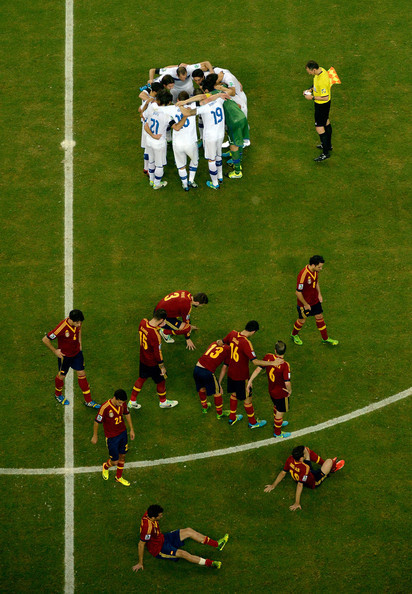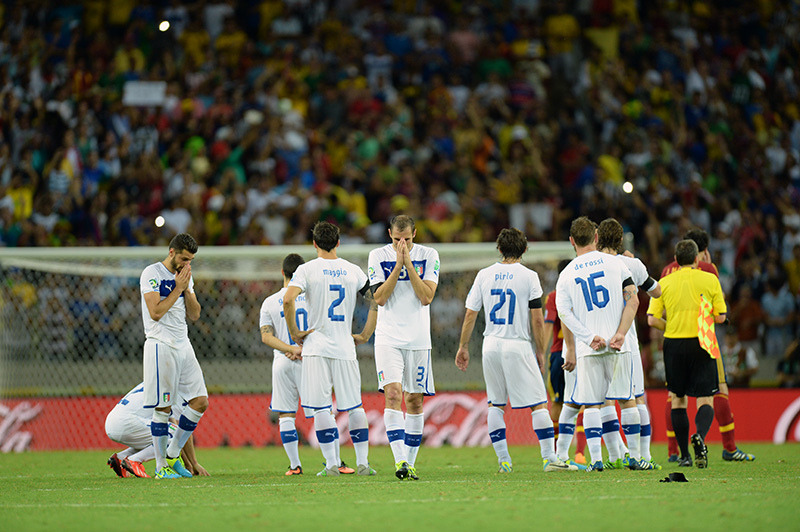Italy: The team that was lost and then found
Italy: The team that was lost and then found

Italy: The team that was lost and then found
By Anthony Lopopolo. Photo: Ryu Voelkel
There was Leonardo Bonucci, sitting down on the ground, hands over his knees, wondering. It was his ball that didn’t go in, and only his. His teammates didn’t yell at him. No one really could. After Bonucci booted the ball into the sky from the penalty spot, where this semi-final of the Confederations Cup was decided, Jesus Navas scored the one that won the game for Spain.
Before Bonucci, 12 players came and scored their penalties, all taken well, low and high. It’s not the he cracked under the pressure – after all, Bonucci once punched a petty thief at gunpoint – but that he was the only one who wasn’t perfect. So his teammates tried to console the inconsolable. They gave him a hand and rubbed his head and tried to get him up. “But there are no words that can make a difference in these moments,” Giorgio Chiellini, a teammate and friend, told Rai Sport.
There were, however, lots of great things to say about the Azzurri, the team that was lost and then found. After such an unimpressive month of football, Italy surprised us. Throughout June, we didn’t recognize them. They conceded goals, eight of them in just three games. They were trying to be someone they weren’t, a team that could attack, but the change in appearance looked goofy. Reckless they were. Italy defended like comical interpretations of themselves, falling over each other, scrambling like teenagers caught drinking.
Against Spain, they were still bold, still different, and this time it worked. No fear shown, no goals given up. The main man, Mario Balotelli, was not there, and he was missed. Italy didn’t score either. But they charged at Spain; not blindly, but with purpose. Iker Casillas, Spain’s formidable goalkeeper, ran out to save a few shots, a header from Italy’s Christian Maggio, and the barrage from Italy continued even if the legs started to shake. The sweat stung, the tempo fell.
In the second half, Italy had 61% of the ball. This they did against Spain, the biggest hoarders of them all, the team that beat them 4-0 in the final of the European Championships last year. Then Emanuele Giaccherini – the small man who almost quit the sport, the ugly duckling unwanted by many fans – hit the post, and that wasn’t his fault, either. Italy showed all of their work, but the final answer just wasn’t right.
Everyone was tired. Andres Iniesta, still darting around the field, had some explosive energy, but the majority of the 22 men on the field were struggling under the heat in Fortaleza. (The players dumped more water over their heads than they drank.) Deep in extra time, Andrea Pirlo, the picture of coolness, waited too long and gave up the ball – again and again. It was as if Spain had hoped Italy would punch themselves out. The world champion could take a lot of blows, but Italy fought back every time.
Even though they lost, the Italians gained something in Brazil: respect, from others and especially for themselves. For the Azzurri, the whole game was an exercise in faith: that they can play with the best. Remember the games that made us smile, that made us cheer and swear, that made us think, and Italy, I’m sure, was there. In 1970 and 1982, against Brazil. In 2006, against Germany.
Here they were again, taking a familiar opponent to the brink. Sure, Italy was defeated. Spain has only lost once to Italy in 15 years. But there is new life, a new line of descendants, a new beginning for the four-time World Cup champion. Daniele De Rossi was the only player on the pitch that took a penalty in the quarter-final of the 2008 Euro, and Pirlo will no longer play for Italy after next year’s World Cup. The coach, Cesare Prandelli, has a contract that ends next year.
“We are still seeking our path,” Prandelli said after the game. That path is getting clearer. There is no obligation to pick defence over offence, no stereotypes coming true. Underneath the seniors is a team of youngsters – the ones under 21 – so utterly uninhibited by the country’s tendency to defend first and to do it well. They scored 40 goals in 15 games. Quietly – and yes, silence is dangerous – Italy has coached kids to play with freedom, technique, and most of all, pride. No one stands and listens to the anthem. There is no controversy: they all belt it out. The team, at all levels, is united, even if the fans are divided between the clubs they support.
It has been three years since the shock in South Africa, where Italy did not win a game in the group stage of the 2010 World Cup. Maybe there is hope for another World Cup. The road to recovery doesn’t look as long as it could’ve been.
This piece was written by Anthony Lopopolo, a Senior Writer for AFR and an expert on all things European football. Follow him on twitter at @sportscaddy. Comments below please.








